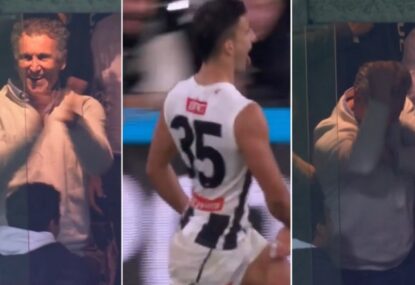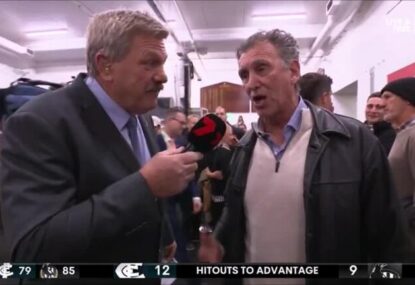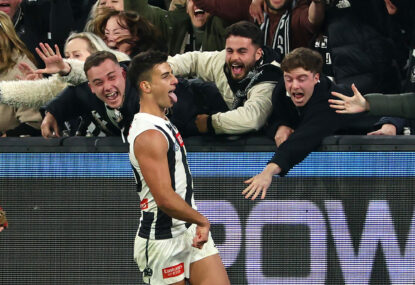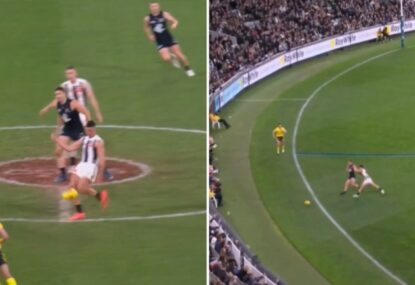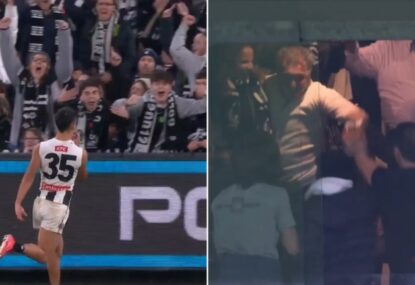Losing a favourite player is always difficult. I would know; I’ve lost half a dozen. Jeff Farmer was the first to go, back in 2001.
I remember overhearing the words “Jeff Farmer” from a distance and instantly running towards the nearest television, as I tended to do whenever the media gave Melbourne any coverage.
It was only a news bulletin, but it was the longest news bulletin of my life. There was Farmer, on screen, training in his Melbourne colours. The news reporter’s voice, however, didn’t match the picture.
Apparently, Farmer had been traded to Fremantle. Just like that, he was gone.
Only twelve months earlier, the Wizard – as the Dees faithful liked to call him – was the most exciting player in the league.
In one of the most breathtaking second halves of football you will ever witness, Farmer booted nine goals against Collingwood at the MCG.
This haul set the Demons up for the remainder of the season, culminating in the team’s strong finals performance and unlikely grand final appearance.
Farmer and his colleagues didn’t take home the premiership that September. But thanks to that single afternoon in round one, Farmer well and truly carved his name into Demon folklore.
He was unequivocally my favourite player. At least he was, right up until he kicked an after-the-siren matchwinner against the Demons in round eight of 2002. It was the worst reunion ever.
While the pain of Farmer’s departure cut deep, I eventually found the energy to love again. But this time around, I wasn’t going to invest my passion in somebody high profile. Instead, I would choose a young player, somebody I could nurture and watch grow up.
Darren Jolly was the most impressive of the youngsters. While the big man didn’t always get much love from his coach, I could tell there was something special about him.
I wanted him to be a centre-half forward, the next David Schwarz. I thought he would be the man to kick all of the goals that Farmer could no longer score.
But Jolly didn’t stick around for much longer. After just four seasons in the red and blue, the developing ruckman quietly departed during the hustle and bustle of trade week.
This news came to me via the AFL trade tracker, a fancy new gadget concocted by the internet. My dial-up connection didn’t handle the news particularly well, and neither did I.
Having suffered as a result of two terrible choices, I switched my allegiances to a mainstay. Adem Yze had always been among my favourite Dees – his ability to repeatedly win the ball was matched by his knack for scoring goals from impossible angles. I knew that backing Yze would be a safe bet.
For the most part, he turned out to be pretty reliable. While Yze tended to flirt with rival clubs during trade week, he never drifted too far from the fold.
Ironically, though, Yze’s overriding sense of club loyalty was his downfall. When Dean Bailey took over the shop, he brought with him a foolproof plan known as a ‘youth policy’.
As such, 31-year-old Yze – despite still being able to kick, run, and mark – was the first on the chopping block. He didn’t need to leave the club; the club got rid of him.
In the meantime, I began to see other people. For a while, I took an interest in Travis Johnstone, the mercurial midfielder who could turn a game upside down in a single play.
Then there was Cameron Bruce, the archetype utility, whose resume included every field position except ruck.
Finally, I found myself impressed with a young man named Brock McLean, who showed maturity beyond his age.
But sure enough, all of these men were gone before I had the chance to say goodbye. Johnstone moved up north to Brisbane, Bruce walked out on the club for Hawthorn, and a disgruntled McLean requested a trade to the Bluebaggers.
Yesterday, the trend continued. Jared Rivers’ departure was a long time coming – his intentions to depart had been made clear for some time.
Nevertheless, I was still overcome with great sadness when the AFL confirmed the rumours that Rivers had struck a deal with Geelong.
On one level, I can’t blame him. If I were at the peak of my playing career, I too would leave a cellar-dweller for a premiership contender, especially if it meant a pay rise.
But as an emotionally invested supporter, I have no time to consider reasonable motives. Ever since Yze’s sacking, the ever-reliable Rivers had been at the top of my list. I even had a chance to share my feelings with the former Rising Star winner when I briefly ran into him at a club function.
His untimely departure leaves me in yet another awkward position. Do I wish Rivers well, and hope he finally finds All-Australian form in Cat colours? Or do I erase all remaining positive memories, and refuse to accept that he ever meant anything to me?
Either way, I am a fool for ever becoming so attached.
Given my run of form, it seems only logical for me to stop choosing favourite players. After all, playing favourites is a childhood pursuit, something I should have outgrown after Farmergate or Jollygate.
But the take home message here is that club loyalty is a myth, and it always has been. Professional athletes will almost always find the dollar – or premiership success – more alluring than the club they were artificially forced to join.
If anything, the supposedly revolutionary free agency system has merely made the process more visible to the public eye.
My advice, then, is for fans to treat football as a team sport – a code where the whole is greater than the sum of its parts. Sure, some players may perform at a superior standard and do the flashy stuff. But please don’t be suckered in by their talent or good looks.
Trust me on this one. Love hurts.





























































































